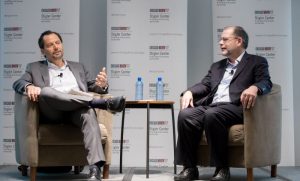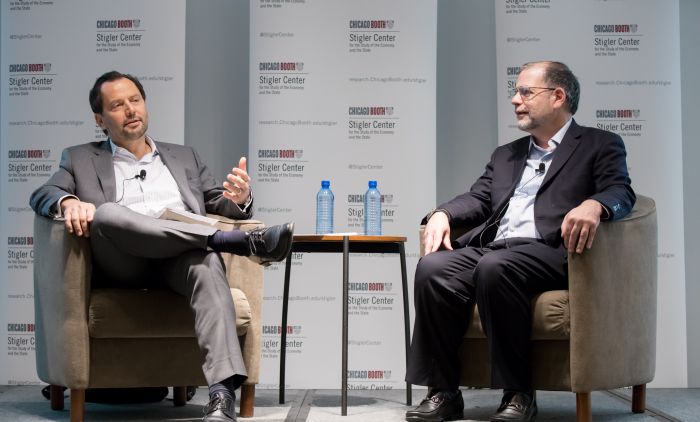In conversation with Stigler Center director Luigi Zingales, Tyler Cowen—one of the brains behind the world’s most popular economics blog, Marginal Revolution—argues that a spirit of self-protection is behind America’s lackluster past growth and its tepid ambitions for the future.

Teenagers are having less sex, protestors are throwing fewer bricks, and Americans’ idea of progress is gentrification and falling crime rates. And all of this spells serious trouble for the future, at least if you experience America the way Tyler Cowen does.
Economics professors may not often develop cult followings on the Internet, but when they do the Stigler Center at Chicago Booth often tries to bring them in to talk about their ideas. To that end, Tyler Cowen, a professor of economics at George Mason University and longtime blogger on the most-read economics blog in the world, Marginal Revolution, sat down on Thursday, November 30, in a public discussion with Stigler Center director Luigi Zingales to talk about Cowen’s latest book, The Complacent Class: The Self-Defeating Quest for the American Dream, where he presents his lament for a bygone era of American restlessness and his recipe for a more dynamic future.
Their talk delved into the nature of the complacency that Cowen argues is sapping America of its innovative spirit, their diverging views on digital monopolies, and Cowen’s policy prescriptions for a more mobile America, with some detours to praise the NASA program of the 1960s or Futurist art of the 1920s along the way.
Individually rational, collectively dysfunctional
Cowen made clear from the outset that the impetus behind the book was his “general feeling that something has gone wrong in America”—a feeling that long predated Trump, who hadn’t even won the nomination when Cowen began his project. “Our politics seems screwy no matter what exactly your stance might be,” he told Zingales. “Real wages have largely stagnated. Productivity growth is down. Different forms of mobility are mostly down. So I tried to look for what would be an integrated, at least partial, explanation of some of these phenomenon.”
He found that explanation when he hit on the notion of complacency, by which he means “a mixture of higher risk aversion, but more generally and a bit more philosophically, that we have largely lost the ability to imagine a future fundamentally different from the present.” He juxtaposes the concept in explicit contrast to the general spirit of postwar America up until around the 1990s. “There’s something to the notion that there’s a spirit of the time in different eras and it changes for reasons that are maybe difficult to explain,” he notes.
The defining feature of our current era, in Cowen’s view, is that Americans’ “individually rational” risk aversion has created negative consequences at the collective level: “It results in lower dynamism. People have fewer children, so their children they treat more as treasures. They are more risk-averse with their children. They are more intent that their children do more homework. Teenagers themselves have less sex than they did the previous generation. Children seem to be drinking less. They’re much less interested in getting drivers’ licenses.”
“I think the overall patterns we see for children and teenagers,” he continued, “indicate less concern for what I would call individual liberty and more risk aversion. More people are growing up in a bad job market. Student debt is more of an issue. The returns to leisure are higher, and that all leads to more playing it safe.”
When Zingales pointed out the oddity of an economist (though admittedly one the media loves to laud as a polymath) looking for explanations of economic phenomena in philosophy or moral norms, Cowen pushed back vigorously: “If you’re going to answer questions about economics you’re going to rely on incentives. And when you rely on incentives you also need to ask ‘How do people perceive the world?’”
“Once you have to look not only at incentives but how incentives are perceived,” he noted, “that broadens the inquiry beyond just economics. A big chunk of my book is economics but I think it’s also the ideas people have.”
Nonetheless, the phenomena of people now having fewer children or waiting longer to get married are, according to Zingales, natural candidates for economic explanations: “It’s not that there is this mojo or this feeling that now we are more conservative,” Zingales insisted. “It’s that [people] are being hit in every dimension and they become more risk averse.” To him, Cowen’s thesis might overemphasize this “mojo” aspect.
But while Cowen insists that his critique of American complacency is no substitute for economic analysis, he sees both economics and sociology as pushing the current zeitgeist in the same direction. The spirit of our time is about more than just economics, he says; it’s at least as much about the advent of the Internet. “At least temporarily, [the Internet has] increased the returns to leisure more than the returns to working,” Cowen notes. “So leisure, free leisure, cheap leisure, being on Facebook is very cheap at the margins. That has a negative impact on the measurable productive side of the economy and I think it also changes the ethos.”
From futurism to dystopia
In his book Cowen says this complacent ethos of the digital era is well represented by smartphones, which he sees as having largely replaced cars in both practical and symbolic ways among American young people. He quotes Mark Liszewski of the Antique Automobile Club of America: “Instead of Ford versus Chevy, it’s Apple versus Android. And instead of customizing their ride, today’s teens customize their phones.”
But to Zingales—who protests that he’d choose the Internet over a car any day of the week—Cowen’s preoccupation with car culture seems to reveal a Futurist-style view of progress as being necessarily flashy, loud, and fast-moving, perhaps at the expense of recognizing progress on, for instance, environmental issues.
“There are many things we’ve done—clean air, cleaner water, the Internet as we’ve used it so far—that genuinely make people better off and happy,” Cowen concedes. The problem is that they limit revenue. “At some point the bills come due and this changing balance of happiness to revenue is socially problematic.” And yes, Cowen does think American culture could use a flashy project to embody what he calls our “will to alter the physical world”—a “dream” like the space program of the 1960s. NASA may well have cost 2 percent of GDP in that era, but it epitomized the ethos from postwar science fiction that “our whole world can be different and better and gleaming and glorious in some way.” Now “people think of progress as gentrification and a falling crime rate,” he laments. “We have really lowered our expectations and you now read dystopias.”
Big tech is not complacent
Ironically, the sector whose products Cowen sees as being instrumental in sapping Americans’ productive energies is itself the one that he views as the country’s least complacent and most dynamic. On this he diverges sharply from Zingales, who has recently worried a great deal about market power in the hands of big tech. Why, Zingales asks, does Cowen worry about reduced dynamism from concentration in general but not about Google and Facebook?
Well, firstly, Google and Facebook charge their users nothing, says Cowen, and what they do charge advertisers usually represents a better deal than they’d get on other media. “When market concentration lowers price I’m usually not that concerned,” he admits. And to Zingales’s worry about lack of data portability limiting competition among tech giants, he counters that, “although people often prefer the walled garden,” a wide variety of social networks do in fact exist—from Facebook to blogs to LinkedIn to the various open-source alternatives that have yet to draw many users. “Until consumer harm is demonstrated, I’m actually pretty happy with the tech sector so far,” he concludes. “It’s all the other parts of the American economy, with a few exceptions, that I worry about.”
How to fix it?
Three percent GDP growth, according to Cowen, is the magic number America now needs to hit if it wants to keep indulging its current taste for stability without hitting a wall in terms of innovation or fiscal health. While his best guess is that three percent will prove elusive, he still offers a laundry list of policy items for policymakers looking to shake America out of its complacent rut.
“I would deregulate most sectors of the economy other than finance and climate and even some of finance,” he tells Zingales. “I would encourage state and local governments to deregulate building as much as they could. I would radically reform our immigration policies to make it sustainable for us to take in a much greater number of people, and I would have an actual fiscal plan to put the budget on a sustainable course. And I would significantly boost funding to science on the innovation side.”
And while the current tax bill does not pass muster—Cowen calls the plan “fiscally unsustainable”—he insists policymakers should urgently lower the corporate tax rate, eliminate deductions, give savings a more favorable treatment, and move toward more progressive consumption taxes. (Incidentally, he deems the proposal in the current plan to levy taxes on graduate student tuition waivers “bizarre” and “not consistent with other features of well-functioning consumption tax.”)
We are the problem
Unlikely as Cowen sees the prospect of a sudden reversal in America’s taste for complacency, the good news is that if Americans themselves are the problem, they are also its solution. “There’s kind of a joke in the title of the book,” Cowen told an audience member who asked about who actually constitutes the complacent class. “People always think, ‘It’s those people.’ But we are the complacent class. It’s really everyone.”
The answer, in that case, to America’s complacency crisis is as simple as shaking ourselves out of the stasis that cocoons us from creative destruction and enrichening disruption.
As simple, perhaps, as collectively stepping away from Netflix or Facebook, getting out into the streets, and heaving a brick or two through the nearest plate-glass window.
Disclaimer: The ProMarket blog is dedicated to discussing how competition tends to be subverted by special interests. The posts represent the opinions of their writers, not those of the University of Chicago, the Booth School of Business, or its faculty. For more information, please visit ProMarket Blog Policy.






